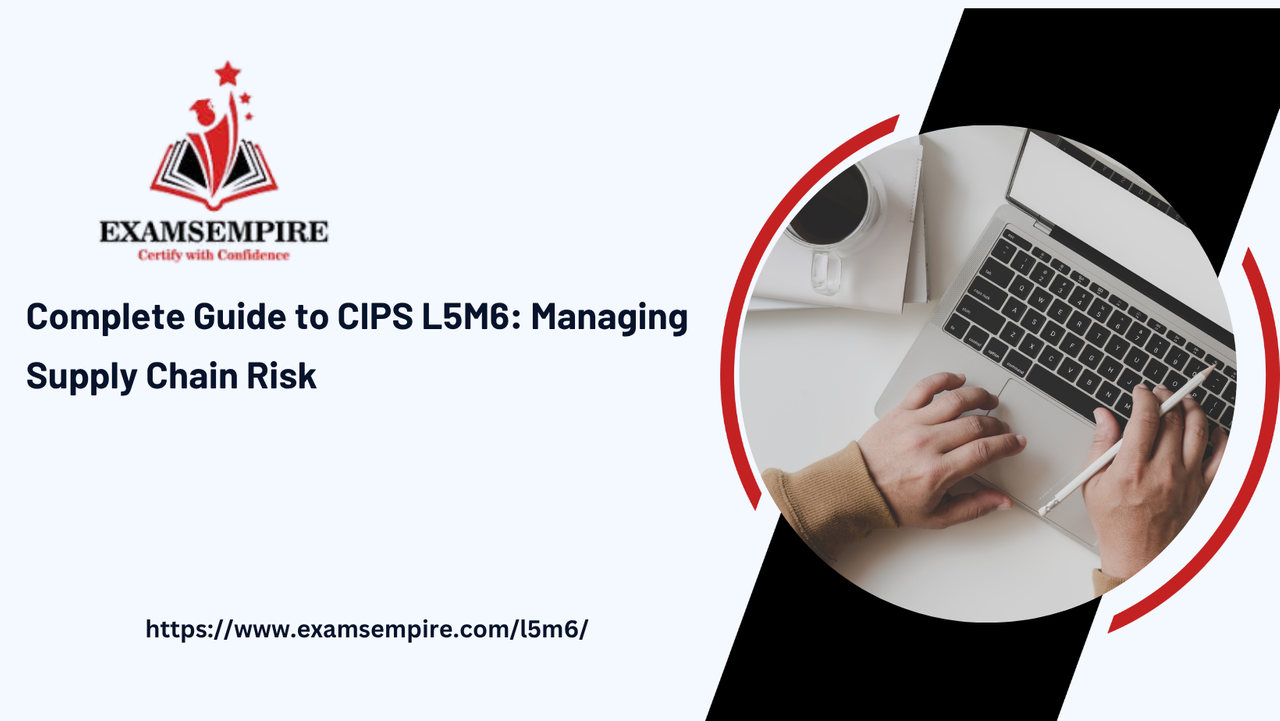The CIPS Level 5 L5M6 – Supply Chain Management module is one of the most essential parts of the CIPS professional qualification. It focuses on the strategies, frameworks, and decisions that build efficient and resilient supply chains in a globalized business environment. For professionals aspiring to become procurement or supply chain experts, mastering this module is a key step toward career growth and industry recognition.
What the L5M6 Module Covers
The L5M6 module explores the core principles of supply chain management (SCM) including design, implementation, and evaluation of supply chain strategies. Learners are expected to understand the interconnectedness of supply networks and how each link—suppliers, manufacturers, logistics, and customers—plays a vital role in achieving organizational objectives.
Key areas covered include:
- Supply chain structures and their strategic purpose.
- Integration of supply chain processes.
- Risk management and mitigation techniques.
- Use of technology and data analytics in SCM.
- Performance measurement and continuous improvement.
This module encourages professionals to look beyond the traditional procurement scope and adopt a systems-based approach to managing supply networks.

The Importance of Supply Chain Management in Today’s Economy
Modern businesses depend on global supply chains. Any disruption—whether due to geopolitical events, economic crises, or natural disasters—can significantly affect operations. The L5M6 module prepares candidates to anticipate, analyze, and mitigate such risks.
Supply chain professionals must ensure continuity, sustainability, and ethical sourcing. With growing consumer demand for transparency and green operations, effective supply chain management now goes hand-in-hand with corporate responsibility.
How to Prepare for the L5M6 Exam
Success in the L5M6 exam requires a mix of theory, practical understanding, and strategic application. Below are proven steps to help candidates prepare effectively:
a. Understand the Learning Outcomes
Read the official CIPS syllabus to know exactly what each learning outcome requires. Focus on understanding concepts, not just memorizing them.
b. Use Updated Study Materials
Study guides, official textbooks, and verified question dumps (PDF or online) are vital. Ensure that your materials align with the latest CIPS updates, as content may evolve annually.
c. Practice Scenario-Based Questions
The L5M6 exam tests your ability to apply theory to real business situations. Practice past papers and mock tests that include case-based questions to develop critical thinking.
d. Create a Study Plan
Divide the syllabus into weekly segments. Allocate time for each section, with additional hours for revision and practice tests. Consistency is more effective than last-minute cramming.
e. Join Study Groups or Online Forums
Engaging with peers preparing for the same exam can clarify doubts and expose you to diverse perspectives on supply chain management practices.
For more information visit us
https://www.examsempire.com/l5m6/
Key Topics to Focus On
To perform well, concentrate on the following essential areas:
- The purpose and objectives of supply chain management.
- The role of collaboration and partnerships in achieving competitive advantage.
- The impact of global trade and technology on supply networks.
- Methods of evaluating supplier performance and sustainability.
- Strategies for managing logistics, inventory, and demand forecasting.
Each of these topics is deeply interconnected, making it important to see SCM as an integrated, cross-functional discipline.
Common Mistakes to Avoid
Many students underestimate the analytical nature of this exam. The L5M6 paper doesn’t simply test definitions; it evaluates your ability to think critically and apply knowledge to real-world business problems. Avoid:
- Relying only on rote learning.
- Ignoring diagrams or models that explain processes.
- Neglecting time management during the exam.
- Failing to connect supply chain theory with strategic decision-making.
Always remember that CIPS exams reward practical application and clear reasoning.
Real-World Applications of L5M6 Knowledge
Professionals who complete L5M6 can contribute significantly to their organizations by optimizing supply chain operations. They gain the ability to:
- Reduce operational costs through improved logistics.
- Enhance supplier relationships and contract management.
- Implement technology-driven solutions for data visibility and performance tracking.
- Drive sustainability and corporate responsibility initiatives.
Employers value CIPS-qualified professionals for their ability to make informed, ethical, and strategic procurement decisions that improve business performance.
Exam Structure and Strategy
The L5M6 exam typically includes a combination of objective response questions (ORQs) and constructed response questions (CRQs). Candidates should:
- Read each question carefully to understand its context.
- Manage time wisely—don’t spend too long on one question.
- Support answers with examples or case studies.
- Review answers to ensure clarity and completeness.
A calm, well-structured approach during the exam can make a huge difference in your overall performance.
8. Career Advantages After Passing L5M6
Earning a pass in L5M6 strengthens your credibility as a procurement and supply professional. You’ll be better equipped to take leadership roles such as:
- Supply Chain Analyst
- Procurement Manager
- Operations Planner
- Strategic Sourcing Specialist
- Supply Chain Consultant
Moreover, the knowledge from this module prepares you for higher CIPS levels, including Level 6 – Professional Diploma in Procurement and Supply.
The L5M6 Supply Chain Management module is not just an academic requirement—it’s a practical toolkit for building resilient, sustainable, and efficient supply networks. By mastering this subject, professionals can transform procurement from a cost-driven function into a strategic enabler of business success. With the right study plan, consistent practice, and a clear understanding of real-world applications, you can confidently approach the exam and achieve your CIPS certification goals.